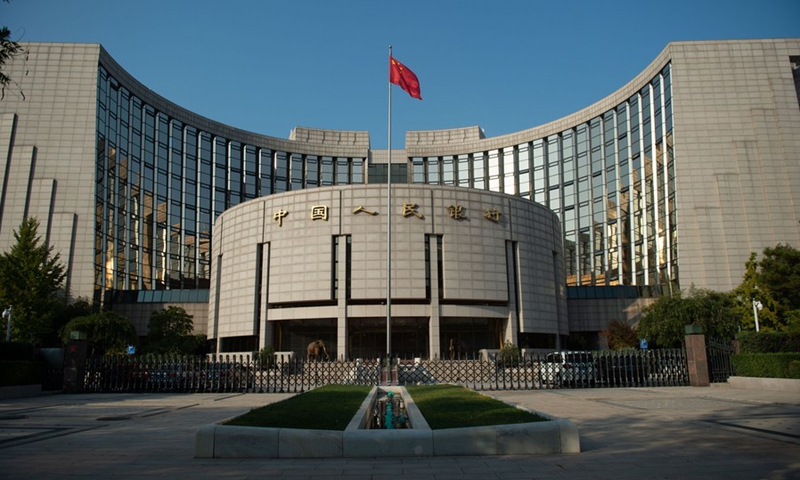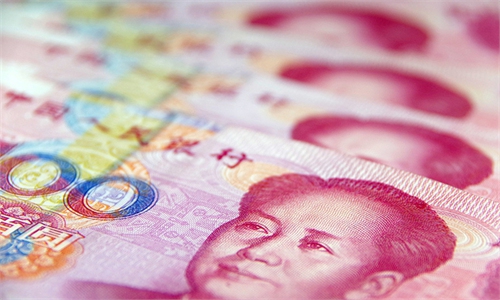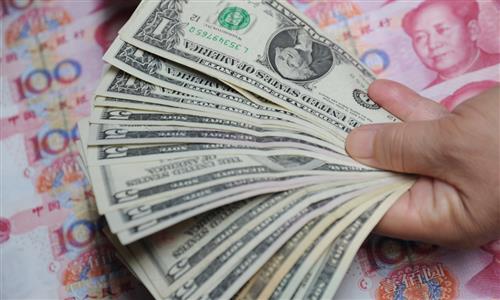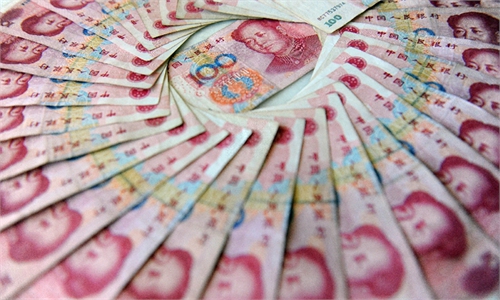
Photo shows an exterior view of the People's Bank of China in Beijing, capital of China. Photo: Xinhua
China's financial regulators have the capability, confidence and conditions to maintain the basic stability of the yuan's exchange rate, the People's Bank of China (PBC) said on Monday, pledging more efforts to correct pro-cyclical and one-sided behavior to curb speculation and other risks.
The central bank made the remarks at a meeting to discuss the country's foreign exchange market.
The onshore yuan immediately strengthened to 7.297 per US dollar at closing time, surging over 500 pips.
The offshore yuan strengthened to around 7.315, also up more than 500 pips as of 6 pm.
The central parity rate of the yuan strengthened 2 pips to 7.2148 against the US dollar on Monday, according to the China Foreign Exchange Trade System.
The meeting pointed out that although the yuan has depreciated against the US dollar recently, it remains basically steady against a basket of currencies and is relatively strong against non-dollar currencies. The operation of the country's foreign exchange market is stable and market expectations are steady, according to a statement on the PBC's website.
The meeting was part of the central bank's efforts to strengthen market communication and guide market expectations, Wang Qing, chief macroeconomic analyst at Golden Credit Rating International, told the Global Times on Monday.
"Strengthening market communication is part of the central bank's toolbox for regulating the foreign exchange market, together with raising the macro-prudential regulation parameters of cross-border financing, lowering the foreign exchange reserve requirement ratio, and increasing the scale of offshore bond issues," said Wang.
There is a solid foundation for the yuan to maintain basic stability at a reasonable level, as the economy continues to gather pace, according to the meeting.
The meeting pointed to efforts to guide enterprises and financial institutions to adopt a risk-neutral philosophy and require foreign exchange market players to take the initiative to maintain market stability, carry out proprietary trading in an orderly fashion and curb market speculation.
As for the reasons behind the recent fluctuations of the yuan exchange rate, Wang said that the US dollar has risen to the highest point since March, resulting in a passive depreciation of the yuan.
In addition to the yuan, other major currencies such as the euro and the yen have depreciated against the US dollar recently. In the short term, the US dollar may remain strong for a period of time, and non-US currencies will face certain depreciation pressure, according to Wang.
Thanks to strengthened macroeconomic policies, the upward momentum of the Chinese economy continues. Moreover, the orderly two-way flow of cross-border capital, the basic balance of international payments and the country's foreign exchange reserves of over $3 trillion provide solid support for the yuan, Zhou Maohua, an economist at Everbright Bank, told the Global Times.
Wang also noted that with steady growth and stable property market policies gradually taking effect, the support for the yuan from China's economic fundamentals will become more and more powerful.
Thanks to the implementation of policies to stabilize the economy, the consumer price index staged a turnaround in August, the foreign trade figures beat expectations, the property sector showed signs of improvement, domestic consumption posted a notable rebound and sci-tech innovations continued to make breakthroughs.



